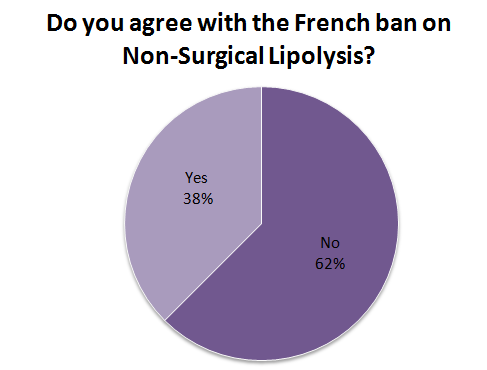
14
Mar
2011
Recently, we reported that the French High Authority on Health (HAS) had prohibited the use of a variety of different Lipolysis cosmetic procedures.
The report stated:
In an effort to investigate the ban further, we made available a fully transcribed report in the clinical information section of The Consulting Room’s member area. The report details the adverse events and other investigations undertaken which resulted in the outlawing of these procedures in France.
50 years after France introduced Mesotherapy it seemed the practice was prohibited. The French Government made all non-surgical Lipolysis illegal deeming it to pose “a serious danger to human health.” The decree (number 2011-382) was put into effect on June 13th 2011. However, in a surprise turn of events The French Supreme court issued an injunction against the decree citing inconsistencies in the broad range of excluded practices.
However, it seems the short-lived ban has had a domino effect in other countries. The Dutch Health Authorities have ordered clinics to stop performing Lipolysis or any fat reduction technique without surgical intervention or face the penalty of a substantial fine, suspension, or in some cases, expulsion from the profession.
The Lebanese Society of Plastic Reconstructive and Aesthetic Surgery (LSPRAS) have also called on their Health Ministry to follow the French example and ban all non-surgical alternatives to liposuction. Former head of LSPRAS Dr. Bishara Atiyeh, cited the serious side effects of Lipolysis and the limited scientific evidence available which proves their safety and effectiveness despite it being so widely used around the world.
These global concerns are also echoed in the US with The American Society for Aesthetic Plastic Surgeons and The American Society for Plastic Surgeons who, through their mesotherapy joint task force, do not support the use of such methods as there is to date, a lack of scientific and clinical research demonstrating their safety.
 |
We asked Consulting Room members what they thought of the French ban. 62.5% of respondents disagreed with the decision to ban non-surgical Lipolysis – one respondent commented that HAS have “not shown any evidence of harm by RF and ultrasound or indeed injections.” However, when asked about the ban pertaining to individual treatments 37.5% said they did support a ban on carboxytherapy. This echoes users’ comments calling for “more regulation in the Aesthetic industry.”
75% of respondents said that they currently use some form of non-surgical Lipolysis in their clinic and the same number, 75% said they feared the French decision would lead to similar bans in different countries. Surprisingly, 57% stated that the ban has had some affect on their willingness to use non-surgical Lipolysis in their clinic in the future.
As it stands now, July 2011, the reversal of the decree by The French Supreme Court has not been challenged and we have not heard a response from the French High Authority. We will, as always, keep our members updated with the latest decisions and updates on the subject.
For information on the current situation, please visit this link to the French Health Authority website (translation is available through Google)